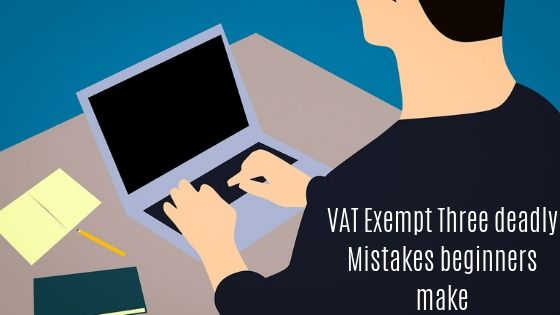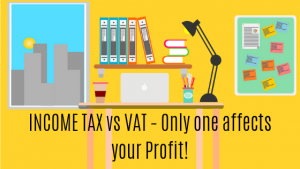1. Better off with being VAT Exempt
Are you really better off? This depends mostly on two important factors
a. Who your lovely clients are.
b. What expenses will you incur in year 1 and also on the years after.
Clients.
So let’s start with your clients…your lifeline whom you must keep happy! Are your clients:
Consumers (Don’t have a VAT number)
OR
– Businesses under ART10 ( Can claim VAT charged)
This makes a huge difference as if your clients are businesses that claim VAT, then charging them VAT is no big deal for them as they can claim it back. Therefore if you charged them €118 (€100 + €180 VAT) they will claim the €18 back meaning their expense is only €100 and love is in the air!
But if you do the same to a consumer, the consumer will suffer the whole €118 since they cannot claim VAT back. Also, other competitors sell the same product at say €100. Then you’re likely at a disadvantage. Try explaining to a consumer you’re going to charge them €18 more due to VAT included in the price compared to Peppi next door and watch them run out like the wind!
Therefore, in the above case if your clients are consumers, registering as VAT exempt would be more strategic since you can charge clients €100 without the need to charge VAT on top and be far more competitive.
Expenses
This factor is sometimes ignored, if your clients are mostly ART10 businesses, then register under ART 10! Why?
You’re just starting out and need to spend on equipment, furniture, IT, advertising and more expenses. These are likely to one be quite a sum, but more important likely also to have a VAT element. You can claim the VAT back under Art10, whilst exempt you can’t ( Blajtha). Also your clients under ART10 can claim back the VAT you charge them so it a win-win(as explained above).
But it doesn’t stop there…
To grow your business or even survive, you constantly need to spend on telephone bills, advertising, more equipment, maintenance and more! These all contain VAT, which you can also claim back. You see where I’m going?
In a nutshell:
– Take a deep breath, prepare some coffee and brainstorm the big picture first
– See who your clients are
– Ask yourself what expenses you will incur and VAT could you can claim back
– Only after weighing the benefits of decide on whether being Exempt is truly and a good idea!
2. Exempt Thresholds are calculated yearly from January to December – Wrong!
Wrong, technically it’s for “ANY” 12 month period! Irrespective of the year.
As you are aware, if any business exceeds €20,000 in services or €35,000 in goods, you are “promoted” to ART 10 and now must apart informing the VAT department, also start charging VAT.
Unfortunately, uninformed businesses assume this means that if between 1st January till the end of year 31st December, one hasn’t exceeded these limits they can remain VAT Exempt. Sadly, that’s not the case.
Example:
Business started operating on 1st May 2019
Then the “any” 12-month period thresholds mean this applies from 1st May 2019 till 30th Apr 2020. ( Not from 1st May 2019 till 31st Dec 2020)
So say:
From 1st May 2019 till 31st Dec 2019, a business sold €15,000 worth of services.
From 1st Jan 2020 till 30th Apr, the same business sold €6,000 worth of services
Technically in a 12 month period, the business sold a total €21,000 (€15,000 + €6,000)
So in a 12 month period, the business exceeded the service threshold by €1,000 and should have switched from ART 11 to ART 10! Ouuchh
Be aware of these Vat commitments to ensure you will have no problems later on.
3. VAT return submission is not needed as I haven’t received one.
You initially registered as only having estimated sales less than €7,000 and thank the stars the no VAT return was not be sent the year after. Therefore you’re not obliged to submit either!
This is where it sometimes gets messy. If you did not exceed €7,000, your right! If on the other hand you beat your own targets (well done) and have €11,000 worth of sales for a particular year, then you are obliged to submit an Exempt ART 11 VAT Return by latest 15th March of the next year to avoid being fined!.
This can be done either by writing to the Department explaining you need a physical VAT return due to exceeding €7,000.
Or you can submit an electronic VAT return online.
BONUS:
Thinking the Vat Exempt is the same as being Tax Exempt… Wrong!
Life isn’t as simple as some think, but we’ll simplify it below:
VAT and INCOME TAX are two separate things, think of them as two dear brothers, they may live under the same roof, but they have different characters, personalities and different rules for your business and your Income
VAT exempt simply means, that if your sales do not exceed the €14,000 or €35,000 threshold, therefore you do not need to charge 18% VAT on top of every sale.
It’s only concern is on your Sales Amount. But this does not mean you don’t have Income Tax to pay.
INCOME TAX, on the other hand, is in love with your Profits.
Example.
In 2019, you have Sales of €15,000 worth of services and after deducting expenses of €2,000 you make a Profit of €13,000.
VAT wise – Sales less then €20,000 – you remain VAT exempt and all is needed is to submit a VAT exempt Return before 15th March.
INCOME TAX wise – A Profit of €13,000 will definitely have some tax on it. The question is how much? This depends if you use the Single Rates, Married Rates or Parent Rates.
For more help on handling the above and many more deadly mistakes to avoid just get in touch with our Vat ninjas and let’s help you out!




